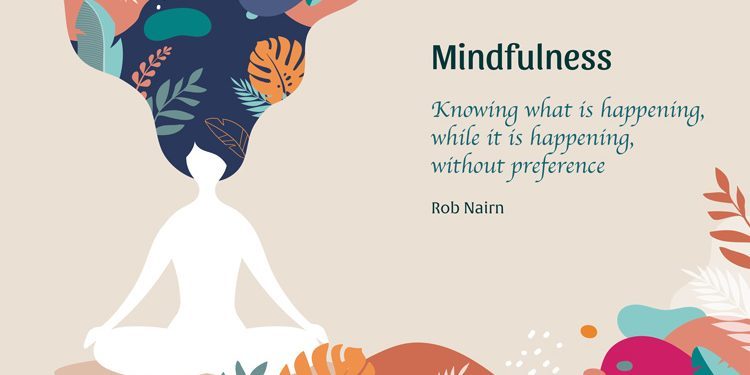Mindfulness is a way of being in our daily lives as well as a way of being that is central to most types of meditation. We practice mindfulness meditation as a way of becoming more mindful in our daily lives. But what do we mean by mindfulness or being mindful?
Here at the Mindfulness Association we us the following operational definition of mindfulness, which was devised by Rob Nairn:
Knowing what is happening, while it is happening, without preference.
This definition has two aspects the first is the technique, which is knowing what is happening while it is happening and means being present and directly attentive to our thoughts, emotions, sensations and perceptions. In meditation practice we apply the technique by noticing whenever the mind has become caught up in thinking and so out of touch with the experience of the present moment. Whenever we notice this we come back to being present, for example by attending to sensations of breathing as focus in the present moment (Choden & Regan-Addis, 2018).
The second aspect is the attitude we bring to being present and attentive, which is an attitude of without preference and means allowing our experience to be just as it is, without preferring or seeking out some types of experience over other types of experience. In meditation practice we engage in cultivating qualities such as kindness and acceptance so as to develop our attitude (Choden & Regan-Addis, 2018).
The main definition used in the field of secular Mindfulness is Jon Kabat-Zinn’s definition of:
Paying attention, in a particular way: on purpose, in the present moment, and non-judgementally.
Again, this definition has an element of technique in paying attention, on purpose and in the present moment and an element of attitude in paying attention non-judgementally.
In this blog I have explored some key research papers that look at definitions of mindfulness.
Bishop et al (2004) also propose a definition on mindfulness with two aspects. The first is “self-regulation of attention so that it is maintained on immediate experience” which allows mental events in the present moment to be increasingly recognised. The second is developing an attitude towards present moment experience “characterised by curiosity, openness and acceptance”. This definition maps well onto the two aspects in the Mindfulness Association’s definition, ie. a technique of paying attention in the present moment and an attitude of openness to acceptance of whatever is present.
Gethin (2011) approaches the definition from a Buddhist perspective and compares it with definitions of mindfulness from modern secular mindfulness. The Pali word sati was translated into English by T. W. Rhys Davids as ‘mindfulness’. Traditionally, the meaning of mindfulness has been informed by ancient Buddhist texts. More recently in the development of secular mindfulness the meaning of the word mindfulness has been informed by the practice of meditation. In particular, the attitudinal aspects of mindfulness highlighted in the definitions above, such as ‘without preference’ or ‘non-judgement’ may not align with the meaning of mindfulness from traditional Buddhist texts.
The traditional Buddhist concept of mindfulness alludes to qualities of “remembering, recalling, reminding and presence of mind”. This concept of mindfulness is about bringing to bear a Buddhist ethical and philosophical stance as we pay attention each moment. For example, bringing “conscience” or “ethical intuition” to each experience we encounter or recognising the impermanence of our experiences. This approach to experience has the aim of “rooting out greed, hatred and delusion” and is missing in secular definitions (Gethin, 2011). Secular mindfulness dispenses with the proscription of a set of Buddhist ethics or philosophy, which is a criticism of secular mindfulness.
Black (2011), interprets Buddhist scholars to suggest that mindfulness means “to pay attention to what is occurring in one’s immediate experience with care and discernment”. He also references Jon Kabat-Zinn’s modern secular definition given above. He goes on to say that contemporary research efforts have indicated that mindfulness is an “inherent quality of human consciousness”. This quality can be developed through systematic mindfulness meditation training (Choden & Regan-Addis, 2018). To help in the understanding of mindfulness Black (2011) contrasts mindfulness with a state of mindlessness in which we are caught up in thinking, for example, about the past or the future, and so unable to pay attention to what is happening now.
Black (2011) goes on to say that development of operational definitions of mindfulness have led to the development of questionnaires to measure mindfulness, such as the widely regarded Mindfulness Attention Awareness Scale (MAAS). The MASS focusses on measuring the technique aspect of mindfulness and asks participants to rank how often they have particular experiences, such as “I find it difficult to stay focussed on what’s happening in the present” and “I find myself listening to someone with one ear, doing something else at the same time”.
Mindfulness can now be measured as a dispositional characteristic (a long term personality trait) and as an outcome from meditation practice (a shorter term state of mindfulness). If we practice mindfulness meditation regularly, over a period of years then the states of mindfulness experienced during and after meditation practice, become traits. A state or trait of mindfulness also correlates with patterns of brain activity which can be measured via brain scans (Goleman & Davidson, 2017).
The field of mindfulness is still relatively young and so definitions may develop, but hopefully the discussion above gives you a flavour of what is meant by mindfulness and mindfulness meditation.
If you want to learn more then why not come along to our free online live daily guided meditations at 10.30am and 7pm each week day or join our next Level 1: Bring Present course to begin your systematic training in mindfulness meditation.
References
Bishop et al, 2004. Mindfulness: A Proposed Operational Definition.
Black, 2011.A Brief Definition of Mindfulness .
Choden & Regan-Addis, 2018. Mindfulness Based Living Course.
Gethin, 2011. On Some Definitions of Mindfulness.
Goleman & Davidson, 2017. Altered Traits.


